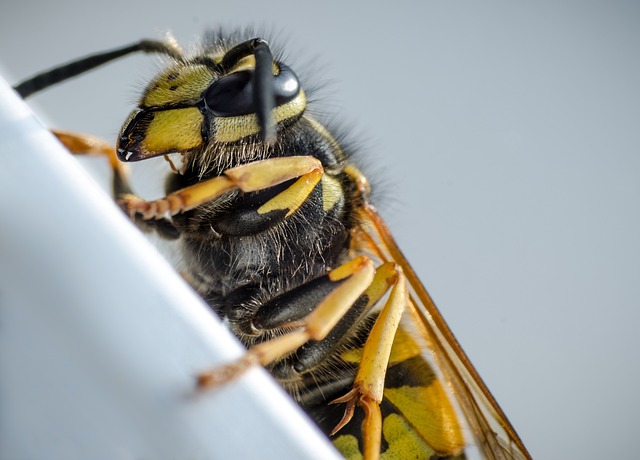Wasp populations can surge from beneficial contributors to pests, but understanding their behaviors offers property owners eco-friendly wasp solution alternatives that minimize environmental impact and reduce health risks. Using plant-based ingredients, essential oils like citronella, lemongrass, lavender, marigolds, basil, catnip, and pheromone traps disrupts communication without harming wasps or other insects. Maintaining a clean environment by removing food sources and garbage further reduces attraction, fostering peaceful coexistence for a safer, more enjoyable outdoor experience.
Transform your outdoor spaces into pest-free havens with tailored deterrents. This guide explores effective strategies to combat common patio pests, particularly wasps, while emphasizing the advantages of eco-friendly wasp solutions. Learn about understanding wasp behavior and discover creative, safe methods to repel them naturally. From identifying ideal implementation practices to maintaining optimal conditions, these tailored solutions ensure a pleasant outdoor experience without compromising environmental health.
Understanding Outdoor Pests: Wasps and Their Behavior
Understanding Outdoor Pests: Wasps and Their Behavior
Wasps are a common outdoor pest, often seen in patios and gardens during warmer months. They play a vital role in nature as predators of other insects, but when their populations grow too large, they can become a nuisance. Eco-friendly wasp solutions are particularly important to consider, as traditional chemical pesticides can harm beneficial insects and the environment.
These social insects live in colonies with a queen who lays eggs for worker wasps and male drones. Worker wasps are responsible for gathering food, building nests, and protecting their colony. They are attracted to sweet substances and protein-rich foods, which is why they often frequent outdoor spaces where they can find an abundant supply of these substances, such as fruit, soda, or meat left unattended. By understanding wasp behavior, property owners can implement effective yet safe deterrents to keep these pests at bay.
The Benefits of Eco-Friendly Deterrents
Using eco-friendly wasp solutions for outdoor spaces offers numerous benefits, both for the environment and for your overall well-being. Unlike traditional chemical pesticides, these natural alternatives are designed to minimize ecological impact while effectively managing wasp populations. By opting for eco-friendly methods, you reduce the risk of contaminating nearby water sources, harming beneficial insects, and polluting the air.
Moreover, eco-friendly wasp solutions are often safer for humans and pets. They utilize plant-based ingredients, essential oils, and other non-toxic substances that are less likely to cause skin irritation or respiratory issues. This makes them ideal for use in gardens, patios, and other areas where people gather, ensuring a pleasant outdoor experience without compromising health and safety.
Creative and Safe Wasp Repellent Methods for Patios and Gardens
Wasps can be a real nuisance in outdoor spaces, but there are creative and safe methods to keep them at bay without resorting to harsh chemicals. Eco-friendly wasp solutions offer a peaceful co-existence for both humans and these beneficial insects. One such method is using essential oils like citronella, lemongrass, or lavender, which have natural repellent properties. You can create homemade sprays or plant these aromatic herbs around your patio or garden to deter wasps without causing them harm.
Another innovative approach is installing specific plants known for their ability to repel wasps. Marigolds, basil, and catnip are popular choices due to their strong scents that wasps find unpleasant. These plants not only serve as natural deterrents but also add beauty to your outdoor area. Additionally, maintaining a clean environment by regularly removing any food sources or garbage can significantly reduce wasp attraction, promoting a safer and more enjoyable outdoor experience.
Implementing and Maintaining Tailored Solutions
Implementing tailored deterrents for outdoor spaces requires a strategic approach, especially when aiming to keep wasps at bay while preserving an eco-friendly environment. Start by identifying the specific wasp species causing a problem and understanding their behavior. Different wasp types have varying preferences for nesting sites and food sources, so a targeted solution is key. Opting for eco-friendly wasp solutions, such as natural repellents or specific pheromone traps, can be highly effective. These methods disrupt the wasps’ communication without resorting to harmful chemicals, ensuring a safer outdoor experience for humans and beneficial insects alike.
Regular maintenance is crucial for the success of these tailored solutions. Wasp habits can change with the seasons, so seasonal checks and adjustments are recommended. Remove any potential nesting sites, like abandoned birdhouses or fallen trees, and keep food sources secure to minimize wasp attraction. By combining targeted deterrents with proactive maintenance, you can create a harmonious outdoor environment where people can enjoy their spaces without unwanted wasp interference.
In conclusion, creating an outdoor space free from pests is achievable through tailored, eco-friendly wasp solutions. By understanding these insects’ behavior, we can implement creative and safe methods to deter them. The benefits of these natural approaches extend beyond pest control, promoting a healthier environment while enhancing our outdoor patios and gardens. With the right knowledge and commitment, it’s possible to enjoy these spaces without compromising on peace of mind or ecological balance.
